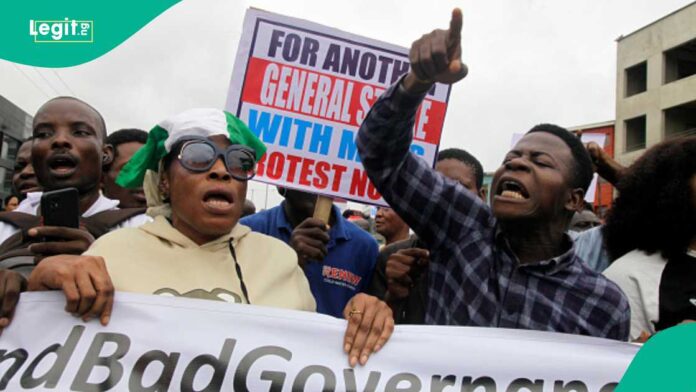By RSM Secretariat
Between August 1 and August 10, 2024, Nigeria witnessed a significant wave of nationwide protests under the banner of #EndBadGovernance. Organized by a coalition of civil society groups, labour activists, and youth activists, the demonstrations were fueled by widespread discontent over economic hardships, government policies, and systemic corruption.
These grievances culminated in a call for mass mobilization, with protesters demanding a reversal of economic reforms, a reduction in political salaries, and judicial reforms.
The demonstrations commenced on August 1, 2024, and rapidly spread across major cities, including Lagos, Abuja, Kano, and Port Harcourt. While many protests remained peaceful, some regions experienced escalations. In Kano, for instance, protesters were seen waving Russian flags, signaling a desire for external intervention.
Despite the largely non-violent nature of the protests, the government’s response was swift and forceful. Security forces were deployed to disperse crowds, leading to confrontations. The National Human Rights Commission reported that over 1,200 individuals were arrested during the protests.
Government’s Response and International Reactions
In the face of mounting pressure, President Bola Tinubu addressed the nation on August 4, 2024. However, his speech was criticized for failing to directly address the protesters’ core demands. A coalition of 18 civil society organizations challenged the president to be more accountable and responsive to the people’s concerns.
International human rights organizations, including Amnesty International, condemned the government’s handling of the protests. Amnesty International reported that at least 24 protesters were killed, primarily in northern states, and many others were subjected to arbitrary detention and excessive use of force. Despite calls for accountability, the Nigerian authorities have yet to take significant action against those responsible for the abuses.
The government also arrested many protest leaders, as we write, eleven of them are still facing trial, the next court date is 9 October. Many activists across the world demonstrated at the Nigerian embassies and high commissions to demand the immediate and unconditional release of these activists. They were later released with strict bail conditions.
Just recently, the Borno State Government arrested seven protesters who participated in the nationwide #EndBadGovernance protest, which took place last year, in August 2024. According to information reaching, seven Borno state youths who participated in the protest were convicted and sentenced to five years’ imprisonment, while the underage among them are subjected to public flogging and community service. This has received widespread condemnation.
Aftermath and Legacy
The #EndBadGovernance protests have left an indelible mark on Nigeria’s political landscape. While the immediate demands of the protesters were not met, the events highlighted the deep-seated issues plaguing the nation. The government’s heavy-handed response has been widely criticized, and the lack of accountability for the violence has further eroded public trust.
But as we write, the illegal arrest and detention of these individuals, coupled with the Nigeria Police (IRT) section’s imposition of Post-No-Debit (PND) orders on the personal and corporate accounts of some of the arrested #EndBadGovernance protesters under the pretense that they are been funded from foreigners to destabilize the country.
In suit number FHC/ABJ/CS/1219/2024, Justice Emeka Nwite issued an order in response to an ex-parte motion filed by Ibrahim Mohammed, counsel to the Inspector-General of Police. The motion alleged that the affected accounts were used to promote terrorism financing, treasonable felonies, cyberbullying, and cyber stalking. The frozen accounts belong to individuals and companies, including PA.LIN.HO Global Service Ltd, Innocent Angel Lovet Chinyere Nkiru, Obidient Movement Multipurpose Cooperative Society, and Great Communicators Champion Multipurpose Cooperative Society Ltd.
Despite their release on bail last year, the accounts of Innocent Angel Lovet, Michael Tobiloba Adaramoye (aka Lenin), and Adeyemi Abiodun Abayomi (aka Yomi) remain frozen, severely hindering their ability to conduct personal transactions. For Innocent Angel Lovet, this injustice has particularly impacted her cooperative and corporate accounts, which involve the finances of other individuals.
We call on the Federal Government to stop restrictions on these individuals’ accounts because this step has badly affected them and their dependents.
Forging Ahead
As we commemorate the first anniversary of the #EndBadGovernance protests, we reaffirm our commitment to workers’ struggles, solidarity and social transformation through a revolutionary socialist struggle. The End bad governance protests can be successful if we are organizing workers committees in workplaces and neighborhoods, through the organization involved having a plan of action and escalation, through a process of openly discussing demands so that different social layers would be drawn into the fight, the same crisis that abruptly affected the End SARs protest in 2020.
We call on the Nigerian working people to build a movement that can wrest power from the ruling capitalist politicians who only rule to serve the interests of their parties and continue to pillage the resources of the country.
The response of the government last year shows that the working people and the masses must prepare to resist all anti-poor, pro-rich policies of the government, and also work toward building a mass working people’s political alternative. Such movement must be built on a socialist ideal and must put the people before profit.



